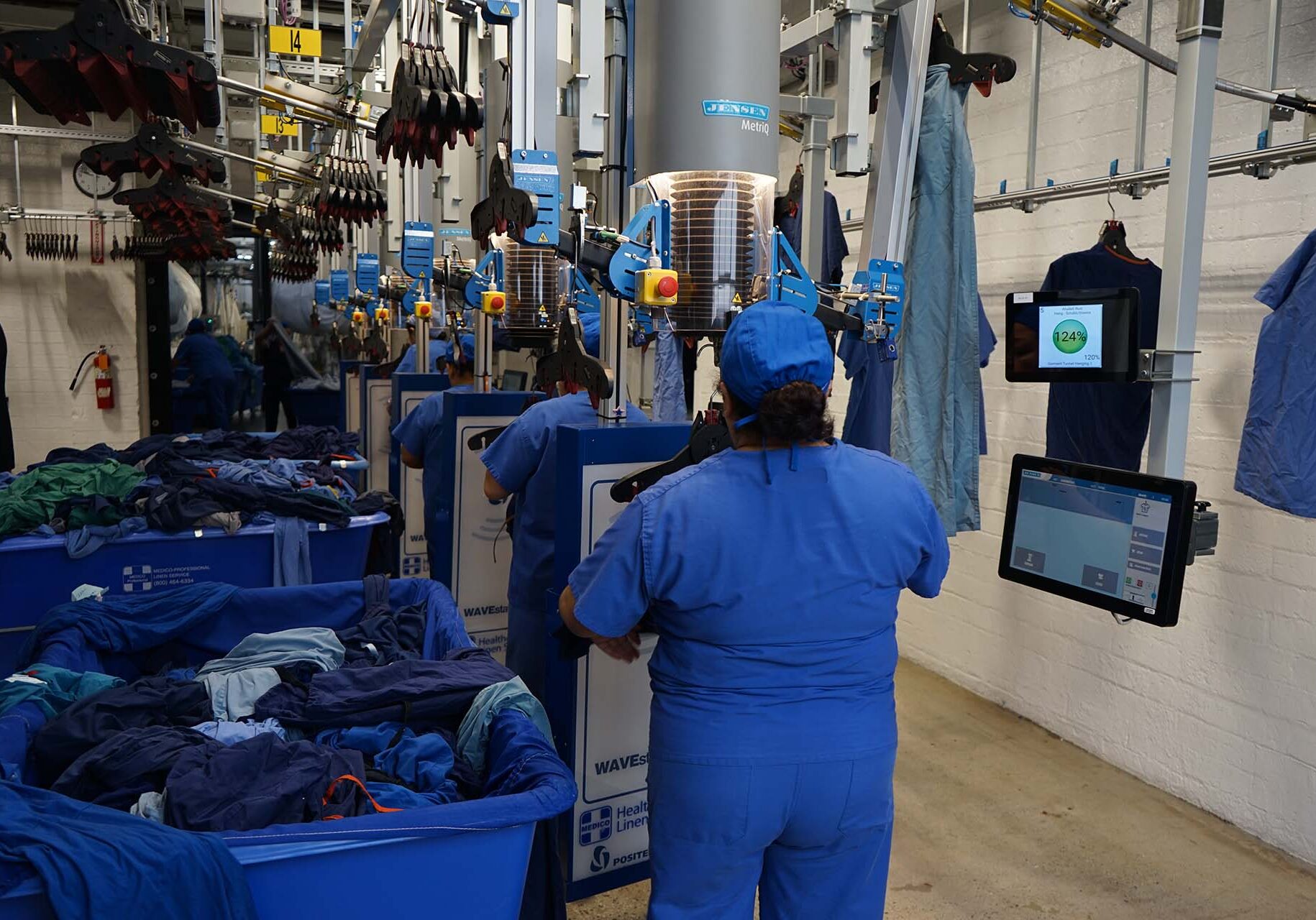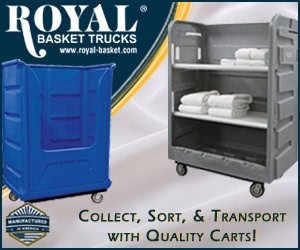Medico Healthcare Linen Service’s Long Beach, CA, plant is operating at near capacity as the company continues expanding in the healthcare sector throughout greater Los Angeles. During a recent visit to Medico’s roughly 45,000-square-foot (4,180-square-meter) Long Beach facility, we observed these industry shifts firsthand. “Our customers are experiencing a rise in their outpatient-care services,” says Greg Shames, VP of operations. At the same time, healthcare consolidation has led to fewer independent clinics and more hospital-affiliated outpatient centers.
The region’s growth in outpatient care is well documented. A 2021 report by the California Health Care Foundation said that from 2014-2018, the number of outpatient healthcare sites grew by 27%, while the number of patients served at these facilities expanded by 33%.
Medico acquired its Long Beach facility in 2005 from Angelica The plant currently processes approximately 450,000 lbs. (204,116 kg.) of healthcare textiles weekly with a staff of 145 production employees working two shifts, Monday through Friday. Medico operates a sister plant in South Gate, which specializes in hospital linens. A separate municipality in Los Angeles County, South Gate is located about seven miles southeast of downtown Los Angeles. Medico also operates four depots across Southern California.
To support its growth, Medico is set to open a third plant in San Bernardino, CA—approximately 70 miles east of Los Angeles. This facility, scheduled to begin operations in the second quarter of this year, will further enhance the company’s ability to meet the region’s increasing healthcare textile needs.
Despite improvements in the post-pandemic labor market, staffing remains a challenge. Shames notes that recruiting requires a proactive approach, including referral incentives and dedicated hiring efforts. “We experience a 10%-20% churn among entry-level staff, which keeps us focused on continuous recruitment,” he says. “Fortunately, our HR team, with skilled recruiters, plays a vital role in maintaining workforce stability.”
Sustainability Initiatives
Medico is also proactively adapting to California’s stringent environmental regulations. That situation shifted on Jan. 13 when the California Air Resources Board (CARB) withdrew its waiver request to the U.S. Environmental Protection Agency (EPA) to implement the Advanced Clean Fleets (ACF) rule. That regulation would have mandated the purchase of zero-emission vehicles (ZEVs) with a goal of having fleet operators in the state convert 50% of their box trucks to ZEVs (electric or hydrogen) by 2035 (see bit.ly/CAtruckshift). Industry observers in the Golden State have commented that CARB withdrew the rule due to hostility from the incoming administration of President Donald Trump. Other analysts believe that EPA regulators threatened to deny the waiver due to the limited availability of ZEV facilities in California, such as substations and transmission lines, that made the ZEV goals unrealistic (see bit.ly/CAtruck25). Either way, California and 11 other states that have pledged to follow its lead on ZEVs still have the Advanced Clean Truck (ACT) rule that mandates increased sales of ZEV trucks. Yet now, there’s no rule to force companies to buy ZEVs. That’s unlikely to change during Trump’s term in office through Jan. 20, 2029.
Meanwhile, Medico’s parent company, Los Angeles-based American Textile Maintenance (ATM), remains committed to sustainability. They are moving ahead with plans to install charging stations at seven locations to support its transition to electric vehicles (EVs). “We’re currently building charging infrastructure at two sites and have ordered 10 EV trucks, with the first one set to arrive in coming weeks,” says Shames. While these EVs won’t initially operate out of Long Beach, they will support other ATM facilities, including Republic Master Chefs plants in Los Angeles and Long Beach, as well as Medico’s South Gate and its soon-to-open San Bernardino location.
Another sustainability initiative is the company’s investment in water conservation. Medico’s Long Beach plant features an on-site well that supplies water for its wash processes. The company invested significantly in rehabilitating the well. “The well existed when we took over the building, but it was non-operational due to deterioration of the pipes,” Shames says. Restoring the well required extensive repairs, but the investment has led to substantial savings on water-heating and treatment costs. “Accessing mineral-free water significantly reduces our reliance on water-softening treatments,” he added.
Further reinforcing its commitment to environmental compliance, Medico recently received a certificate of recognition from the Long Beach Water Department for its excellence in wastewater management.
Inside Medico Long Beach
During our tour, General Manager Frank Lopez, Plant Manager Francisco Garcia, and Chief Engineer Jesus Rubalcava provided insights into the plant’s operations. Goods from Medico’s 39 routes (from four depots) arrive via trucks at the rear loading dock. Uniforms and other specialty items are scanned in using radio-frequency identification (RFID) tags from Positek RFID. This allows real-time tracking throughout the process. Flatwork production is monitored through Spindle software. Screens display productivity metrics at key workstations.
Employees sort textiles manually via a Colmac Industries Inc. vacuum system that transports items into one of five bulk bins or a sweeper belt. Once sorted, textiles are stored in slings and transferred to an ETECH overhead rail system for processing in either a Senking/JENSEN tunnel washer or one of four conventional washers. The tunnel washer has 14, 200 lb. (90 kg.) chambers. The conventional washers include a 900-lb. (408 kg.) Ellis Corp. machine, a 450 lb. (204 kg.) JENSEN unit, a 275 lb. (124 kg.) Brim Laundry Machinery Co. Inc. washer and a 100-lb. Pellerin Milnor Corp. machine.
Ecolab Inc. provides wash chemistry via an automated chemical-injection system. To maintain hygienic standards, the plant holds both Hygienically Clean and HLAC certifications. This ensures strict separation of soiled and clean areas.
On the clean side, garments are processed using JENSEN’s Metricon automatic sorting system, which scans RFID tags before directing items to a JENSEN tunnel finisher. Once wrinkle-free, garments proceed through the Metricon sorting system to be organized by route, customer and individual wearer. The plant also houses three ironer lines—two from JENSEN and a vintage small-piece ironer from JENSEN Ultima. Additionally, the plant has seven towel folders from JENSEN and Foltex. Lastly, we saw the scrubs from the METRICON undergoing automatic folding by two JENSEN automatic folders.
To enhance efficiency, Medico has automated the wrapping process for bundled textiles. Two Felins shrink-wrapping machines encase goods in protective plastic before they are conveyed to the packout area for distribution.
Poised for Growth
As Medico’s Long Beach plant operates at near capacity, the upcoming addition of the San Bernardino facility will provide much-needed relief and additional growth opportunities. “This plant is extremely busy, and we’re excited to bring the new facility online,” Shames says. “We’re seeing hospitals acquiring outpatient sites and expanding their reach. Our business is shifting to accommodate that trend.”
These industrywide changes require laundry operators to be versatile, efficient and forward-thinking. Medico is meeting these challenges head-on with a robust infrastructure, a dedicated workforce and innovative sustainability initiatives. With the San Bernardino plant on the horizon, Medico is well-positioned to support the evolving needs of Southern California’s healthcare industry. TS
JACK MORGAN is senior editor of Textile Services. Contact him at 540.613.5074 or jmorgan@trsa.org.
Byline
By Jack Morgan
Categories
Magazine Article Type
Feature
Starting Page
30




